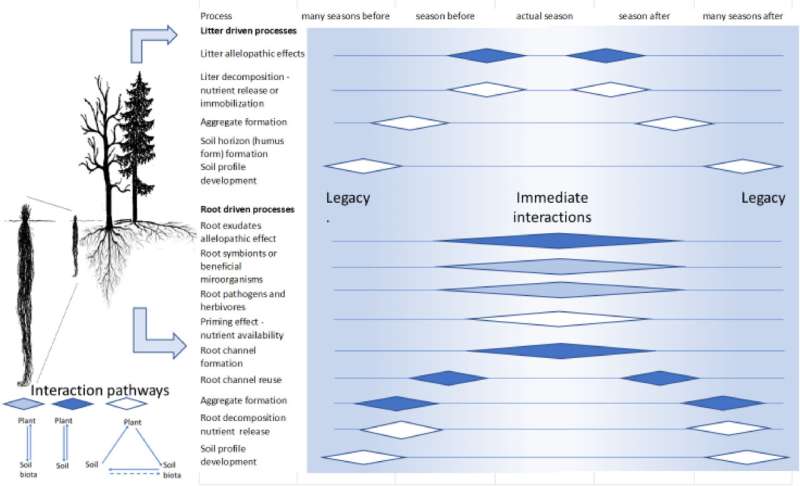This article has been reviewed according to Science X's editorial process and policies. Editors have highlighted the following attributes while ensuring the content's credibility:
fact-checked
trusted source
proofread
Study unveils how plants and soil biota forge ecosystems over time

A study by ecologist Jan Frouz from Faculty of Science at Charles University has unveiled the intricate dynamics of plant-soil feedback across a wide range of spatiotemporal scales, from immediate effects to long-term legacies. Published in Soil Biology and Biochemistry, the research highlights the complex interplay between plants, soil, and soil biota, revealing the profound impact of their interactions on ecosystem engineering and sustainability.
Key insights into plant-soil feedback mechanisms
The study identifies three primary pathways through which plants and soil biota interact:
- The biota pathway, where plants influence soil biota, such as symbionts or antagonists, which in turn affect plant growth and health.
- The soil pathway, where plants alter the soil environment, subsequently impacting plant life.
- The biota-soil pathway, showcasing how plants affect soil biota, leading to changes in the soil environment that affect plants in return.
These interactions are crucial for understanding how ecosystems function and evolve over time. The research emphasizes that living plant roots predominantly drive immediate effects through the biota pathway, while plant litter plays a critical role in supporting legacy effects crucial for long-term ecosystem health and resilience.
Legacy effects: Building ecosystems over time
One of the study's most significant findings is the concept of legacy effects, which arise from the accumulation of small, short-term changes in the soil. These legacy effects have the power to alter the outcomes of immediate interactions between plants, soil, and soil biota, leading to either gradual or abrupt shifts in soil properties. Such changes can reach tipping points, drastically altering the functioning of entire plant-soil systems.
The research underscores the importance of legacy effects, especially in soils that have been disturbed, are subject to land use change and are at early stages of development or during recovery after disturbances. These insights are vital for ecosystem restoration, agriculture, forestry, and combating the effects of biological invasions.
Implications for future research and practices
Most manipulation- experiments focusing on ecosystem response to various manipulations are relatively short term (3–5 years). However many important and substantial responses happen in decade time (10–30 years). Exploring these medium- to long-term responses is important not only for fundamental understanding but also for many practical reasons.
This study calls for a comprehensive approach to studying plant-soil feedback across all relevant spatiotemporal scales, highlighting the need for strategies that consider both immediate interactions and long-term legacies. By understanding these complex dynamics, scientists, policymakers, and practitioners can better design interventions to enhance ecosystem resilience and sustainability.
The findings mark a significant advancement in ecological research, offering new perspectives on how to nurture and protect our planet's vital ecosystems.
More information: Dihub Jan Frouz, Plant-soil feedback across spatiotemporal scales from immediate effects to legacy, Soil Biology and Biochemistry (2023). DOI: 10.1016/j.soilbio.2023.109289
Provided by Charles University




















